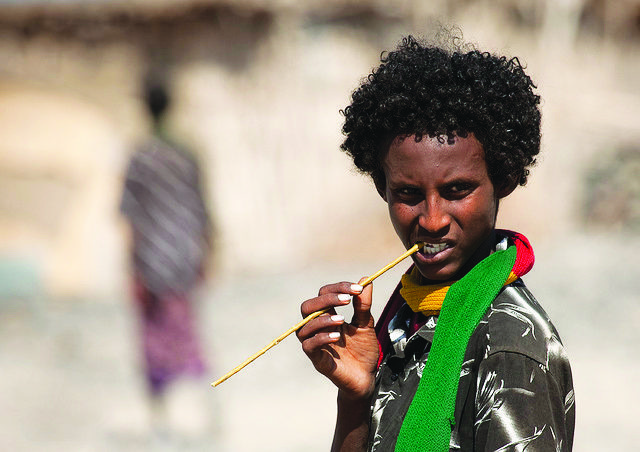For then I will give to the peoples purified lips, that all of them may call on the name of the Lord, to serve him shoulder to shoulder. From beyond the rivers of Ethiopia my worshipers, my dispersed ones, will bring my offerings.
Zephaniah 3:9,10 (NASB)
Ahemed passes the thorn barricade surrounding his Afar community and returns to the oval-shaped hut covered with palm mats that comprises his home. His cousin Hassan has a public sector job and lives in a city of concrete buildings, but Ahemed lives like most Afar, a nomadic people herding their goats or cattle, or farming salt from the hot flats in the desert valley of the volcanoes.
Later, as darkness envelopes them and the extreme daytime heat abates for a few hours, Ahemed and his father Yaaseen sit around the fire, having eaten their portion of goat’s milk and meat prepared by Ahemed’s mother. Yaaseen talks about Hassan who is far away in the city. Holding his semi-automatic rifle, he reminds Ahemed that they are a people proud for their physical strength and bravery. “Afar means first and the best!” he vigorously tells Ahemed.
From their simple but mobile hut comes a whimper. Ahemed’s sister Semira lies on a mat on the dirt floor. She has been very ill now for five days. Yaaseen already visited wise Edris, who knows some of the Qur’an, and sought his advice and a cure. Semira now wears a small pouch as an amulet around her wrist – the old man placed special herbs and some verses from the Qur’an into it. Yaaseen also follows the man’s instructions to daily pass by the sacred tree while calling out the shahada several times. Behind the thin wall of the hut Semira whimpers again and cannot sleep.
Most of the Afar (estimates vary from 1.7-2.6 million) dwell in the Danakil Desert region – one of the most difficult places to live on the entire globe due to extreme high temperatures, lack of rainfall, and caustic volcanic activity. In addition, they are subject to tribal wars, scarcity of water sources and famine.
Most Afar follow folk Sunni Islam, mixing their traditional beliefs and practices dating from long ago with their adopted Muslim religion. They trust in the powers of certain trees and groves, the spirits of the dead, and seek power through various religious rituals and amulets.
Due to their environment and nomadic lifestyle, the Afar have an extremely low literacy rate – about 1%. Their location means a great shortage of pure water sources for themselves and their herds. Most importantly, the Afar need to know the One who offers them the water of life that will quench the thirst of their souls.
Jesus answered and said to her, “Everyone who drinks of this water will thirst again; but whoever drinks of the water that I will give him shall never thirst; but the water that I will give him will become in him a well of water springing up to eternal life.”
John 4:13,14 (NASB)
Pray for the Afar
- Nearly all the Afar of East Africa are lost and without hope, and they are an exceptionally difficult people group to reach due to physical, spiritual and cultural hurdles. Ask the Lord of the Harvest for workers who will bravely reach out to the Afar with a long-term commitment to learn from them and share their lives and Good News with this people group.
- Pray for workers well prepared to share the Word among this Muslim people group and use oral Bible storying methods in the local language to reach this mostly illiterate people.
- Ask the Lord to prepare the soil of Afar hearts for the sowing of the Good Seed, that it may be received, grow and bear fruit.
- Ask that more Good News audio media be made available for the Afar people, and that God would pour forth his power upon the Word as it is shared through radio, the JESUS video and audio recordings.
- Pray that water, animal husbandry and other development programs and health care initiatives would become a reality; that they would be culturally sensitive, bear witness to the Truth, and be sustainable and reproducible.
- Pray for the many East African churches to acknowledge God’s love for the Afar, be burdened for that harvest field, and send out equipped workers to serve among the Afar, crossing the existing barriers in the power of Jesus’ Name.
